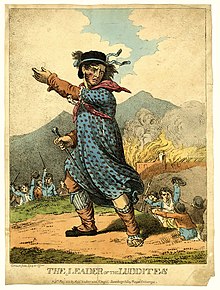Luddite
The Luddites were a secret oath-based organisation of English textile workers in the 19th century, a radical faction which destroyed textile machinery as a form of protest. The Luddite movement began in Nottingham in England and culminated in a region-wide rebellion that lasted from 1811 to 1816. The group are believed to have taken their name from Ned Ludd, a weaver from Anstey, near Leicester.

They protested against manufacturers who used machines in what they called "a fraudulent and deceitful manner" to get around standard labour practices. Luddites feared that the time spent learning the skills of their craft would go to waste, as machines would replace their role in the industry. Many Luddites were owners of workshops that had closed because factories could sell the same products for less. But when workshop owners set out to find a job at a factory, it was very hard to find one because producing things in factories required fewer workers than producing those same things in a workshop. This left many people unemployed and angry. Over time, the term has come to mean one opposed to industrialisation, automation, computerisation, or new technologies in general.
| This theme article is a stub. You can help out with Wikiquote by expanding it! |
Quotes
edit- As the liberty lads o'er the sea
Bought their freedom, and cheaply, with blood,
So we, boys, we
Shall die fighting or live free,
And down with all kings but King Ludd!- Lord Byron, Song for the Luddites (1816)
- The attack of the Luddites was not occasioned by the introduction of new machinery, however, as is commonly thought, for there is no evidence of such in 1811 and 1812 when Luddism proper began. Rather, the destruction was leveled at the new slip-shod methods which were ordered into effect on the extant machinery. Not an attack against production on economic grounds, it was above all the violent response of the textile workers (soon joined by others) to their attempted degradation in the form of inferior work; shoddy goods — the hastily-assembled "cut-ups," primarily — was the issue at hand.
- John Zerzan, Elements of Refusal (1999), p. 108
- To wonder what was so radical about a movement which seemed to demand "only" the cessation of fraudulent work, is to fail to perceive the inner truth of the valid assumption, made on every side, of the connection between frame-breaking and sedition. As if the fight by the producer for the integrity of his work-life can be made without calling the whole of capitalism into question. The demand for the cessation of fraudulent work necessarily becomes a cataclysm, an all-or-nothing battle insofar as it is pursued; it leads directly to the heart of the capitalist relationship and its dynamic.
- John Zerzan, Elements of Refusal (1999), pp. 108-109